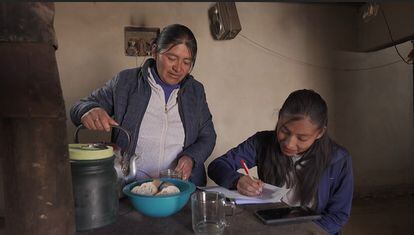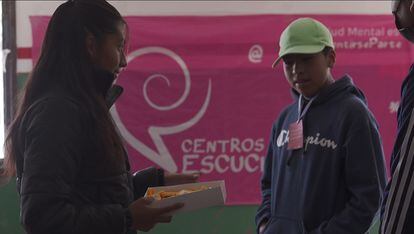EL PAÍS offers the América Futura section openly for its daily and global information contribution on sustainable development. If you want to support our journalism, subscribe here.
The Puna of Argentina is a brave thing to live in. Once, the writer Héctor Tizón defined it in the following way: “Here the land is hard and sterile; the sky is closer than anywhere else and is blue and empty. It doesn't rain, but when the sky roars, his voice is terrifying, implacable, angry. On this earth it is difficult to breathe…”
San Antonio de los Cobres is a town in the Puna of the province of Salta, in the north of the country. Its name occupies an important place in tourism because the Train to the Clouds departs from there, a railway service that connects the place with the La Polvorilla viaduct, about 4,220 meters above sea level on the Andes Mountains. That railway section is one of the highest in the world. It is also an area with lithium deposits.
But in recent times, his name has topped an alarming statistic. San Antonio de los Cobres has a teenage suicide rate ten times higher than the average for Argentina. The statistics in the rest of Salta, compared to other provinces in the country, are not better: in 2021 – there is no more recent official global data – the rate in the province per 100,000 inhabitants in adolescents between 15 and 19 years old was 36.1, well above the 8.5 at the national level.
A detail that shows how shocking the phenomenon is. At the exit of San Antonio de los Cobres, there is the Huaytiquina Bridge, from where many teenagers jumped. It happened so many times that, in the town, the young people renamed the place “Bridge of Solution.”
With the aim of providing support to children and stopping the wave of suicides, the Undersecretariat of Social Medicine of Salta and Unicef promoted the installation of the Listening Center with Adolescents in the place in 2022. The objective was prevention and health training community mentality of a team of adults and adolescents.
Since the installation of the Listening Center with Adolescents in a club in the town, Agustina Soriano was one of the first – and most active – volunteers, who came motivated by the suicide of two close friends in just two months. Other people close to him cut their wrists or started drinking alcohol at an early age. Her work and that of other young people like her is essential to sustain these spaces.
“We enthusiastically welcomed the idea of a listening center. In a way, we were intermediaries so that other kids could vent and not make a hasty decision. We have the support of a social worker and a psychologist,” says Soriano.
The group dynamics include games, other instances of socialization to express feelings and simple questions. For example, how did you feel when you arrived here? How are you going home now? In those meetings, the most frequent problems began to appear.
“Here in San Antonio de los Cobres, there is a very popular prejudice that says: 'Going to a psychologist is for crazy people,'” explains Soriano. “In the activities, we try to break those patterns so that the kids have confidence and ask for help. Many find that their parents do not pay attention to them when a younger child arrives. Sometimes they told us, 'My mom and dad don't care about me.' A chat of just fifteen minutes a day can be a great containment. Ask how you are, how school went… These are basic things,” says this young woman who received training with UNICEF and other institutions.
The infrastructure in San Antonio de los Cobres is limited. At the local hospital, there is a mental health office, which has a psychologist and a social worker. The work of adolescents in the Listening Center with Adolescents was always supported by professionals. Angélica Guitian is a psychopedagogue and was part of the center when it began in 2022, a year with several cases of suicide in the town.
“It wasn't just the accomplished facts, but also the attempts,” Guitian says of the experience. “In the first meetings with the boys, family problems and the lack of job opportunities or studying a career appeared. Suicide was the most relevant problem, but many others take refuge in alcohol. I was able to delve into the daily lives of young people and their problems. From my professional role, I tried to provide educational and emotional advice. For example, something simple like recognizing our emotions and being able to express them. That was complemented with the help of other professionals.”
“In addition to the problems at home – adds Soriano – those linked to courtships appeared. Many young people told us that they felt very bad when a boyfriend or girlfriend abandoned them. They separated and that situation led them to the idea of suicide,” he says.

The Listening Center with Adolescents that began operating in San Antonio de los Cobres expanded to Chicoana, a town located 40 kilometers south of the city of Salta. This strategy of mental health promotion and support for adolescents in complex situations is capable of slowly changing the social reality of the towns, according to the officials' views.
“The experience in both centers was very rich, as was the exchange between the kids from those towns in the interior of the province. One of the first diagnoses indicated that adolescents had no one to talk to nor could they find places to hang out. These centers are a participatory space for listening without prejudice,” analyzes Gabriela Dorigato, in charge of the Undersecretariat of Social Medicine of Salta.
Surrounded by stigmas, myths and taboos, suicide is a public health problem, which is always multi-causal and requires a comprehensive approach. Dorigato believes that the centers served, at least, to recognize the problem in the community. “Our activities are preventive in nature and with multi-sector participation. It is positive to know that the space is made visible and supported by the community. In San Antonio de los Cobres, for example, they carried out an important campaign in the Carnival. Mental pathologies are multifactorial and require the partici
pation of all social actors for prevention. Improvements will come with time. Meanwhile, we prepare the adolescents, who are coordinators and who support and advise their peers,” he said.
Agustina Soriano wants to continue helping others. She tells of her own project focused on mental health in schools. “I'm going to help when they need me. For example, on exam days or in specific classes, always with the support of specialists. Although suicides have stopped, there are other problems, such as drugs and alcoholism. And I found out about several cases of sexual abuse,” she says.
The initiative could be described as successful because neither in 2023 nor so far in 2024 have they had news of any suicide. Beyond public policies aimed at prevention, Soriano leaves, in the end, a reflection, almost a request for adults: “Parents have to understand that, even if we are 20 years old, we still need them.”

#launch #Listening #Center #prevent #adolescent #suicide #northern #Argentina

